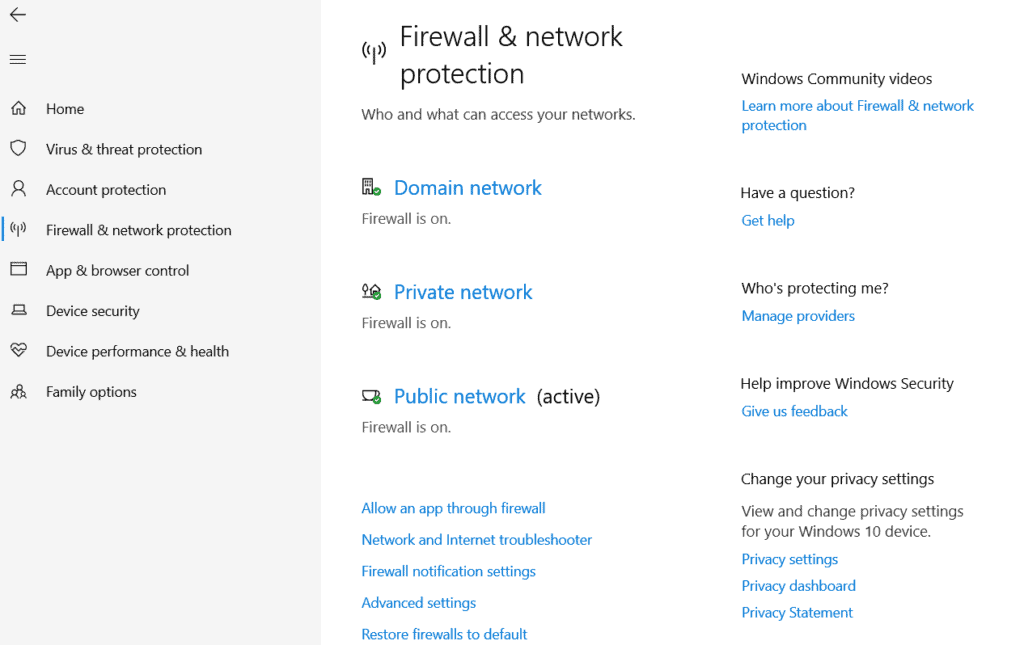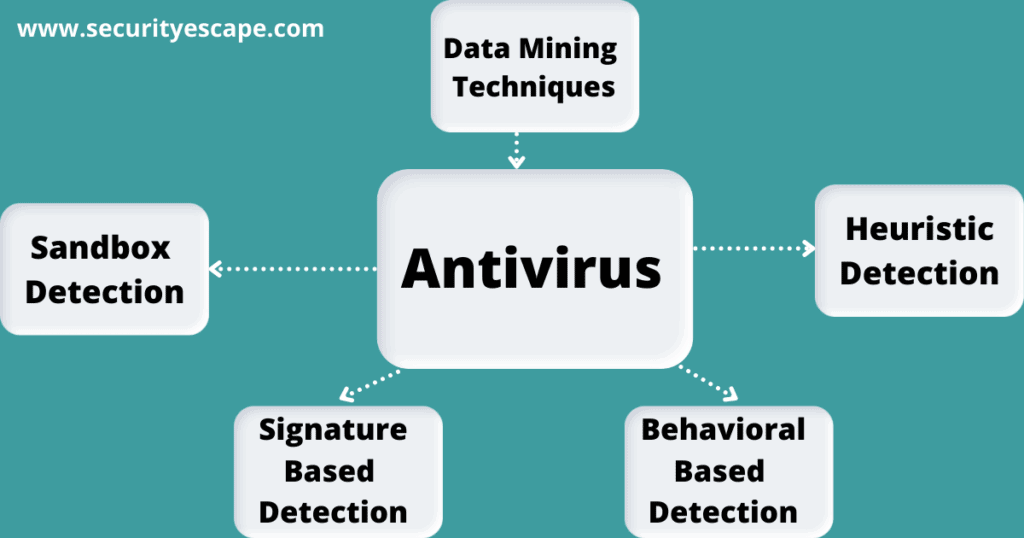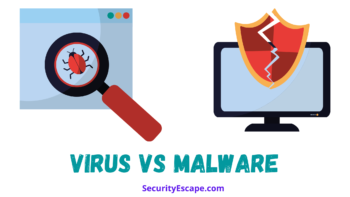
The terms Firewall and Antivirus are often used interchangeably because of very similar mechanisms. But there are some basic differences between Firewall and Antivirus.
Don’t worry about not being from the technical background because I have explained these two terms in the easiest possible way.
For a short Introduction
The difference between Firewall and Antivirus is “The Firewall is the combination of hardware and software that works as a barrier to the unwanted traffic from Public Network to The Private Network”. Whereas an Antivirus is software that Scans, Identifies, and removes existing Malicious codes, and Viruses in the computer system.
Quick Summary
- The Firewall is also called “Packet Filter” because the basic working of firewall is to monitor and Filter the incoming data packets from Public Network.
- The basic task of a firewall is to prevent unauthorized access from Public Network. It can’t handle internal security issues.
- As per requirement it can consists of both hardware and software.
- The filtering process can be controlled through the rules set by admin.
- The Antivirus is used to ensure the internal security of the computer from existing viruses and malwares.
- It can scan, detect and remove the malicious codes from the computer.
- It is software that consists of library of definitions of malwares found till the date.
Contents
What is a Firewall?

As the name suggests “A Firewall works as a wall between a Public Network (Internet) and Private Network (Intranet)”.
It is also known as “Packet Filter”.
That means Input data packets are being filtered through Firewall then reach the Private Network.
The Setup of a Firewall is the Combination of both Hardware and Software.
The Protocols to filter Data packets are set manually by the admin.
Mechanism of Firewall
Data Packets are filtered according to the protocols set by the admin.
IP Based:- Firewall filters the data on the basis of IP address.
Domain Based:- Firewall filters the data on the basis of domain names.
Port-Based:- Firewall filters the data on the basis of Ports.
Program-Based:- It filters the data on the basis of particular definitions.
Keyword Based:- It filters the data on the basis of pre-defined keywords.
Types of Firewall
There are three types of Firewalls
- Application level Firewall
- Network Layer Firewall
- Circuit Level Firewall
Based on requirements we use these two types of Firewalls
- Host-Based Firewall
- Network-based Firewall
Host-Based Firewall

This type of Firewall can be installed on an individual computer. It is Software-based and protects an individual computer only.
For Example, the Built-in Firewall of the Windows Operating System and Third-party Firewall like “Zone Alarm.”
Network-Based Firewall
This type of Firewall is a combination of software and hardware. It can be installed to protect the whole private network.
It is deployed to filter the Data packets entering the router. In some routers, it is a built-in element.
For advanced security requirements both Host-Based and Network-Based Firewalls can be installed.
Major Organizations use both of these Firewalls simultaneously to protect the data from increased cyber-attacks.
What is Antivirus?
In simple words “An Antivirus is software that has the capability to scan, detect, and remove the malicious codes, Viruses, and Malware”.
It is a set of definitions that scan other files within the system and identify the unusual files, codes, and software.
If the behavior of a particular file seems suspected, It removes that file.
Mechanism of Antivirus

A legit Antivirus comes with huge definitions of the library. This library consists of different definitions of viruses found till date.
This library must be updated on the regular basis.
If during the scan, Antivirus finds a file matching with library It’ll flash an alert immediately.
Now you’ll have the option to report or remove that particular file.
The Antivirus can detect and remove the viruses only. It is not effective for Trojan or Ransomware.
Differences between Firewall and Antivirus
- A Firewall works like a Filter between the traffic/ Data Packets coming from Public Network to The Private Network. That means it provides security from outside cyber-attacks. Whereas an Antivirus Scan, Detect and Remove the Viruses from Inside the System. That means it provides internal security.
- A Firewall is a combination of both hardware and software. A host-based firewall is software-based and a Network-based firewall is a hardware and software-based. While antivirus is Software.
- A Firewall Provides external Security, whereas an Antivirus provides Internal Security. The Filtering Process of a firewall can be altered by changing the rules or protocols by the admin. But the process of an antivirus can’t be altered manually.
- We can install a firewall in an individual computer as well as in the whole network but an antivirus can be installed on an individual computer only.
- Firewall security can be bypassed through some tricks like VPN and IP Spoofing. The Antivirus security can’t be bypassed but can be manipulated by some newly developed and well-encrypted viruses.
- The programming complexity of a firewall is much higher than that of an antivirus.
- The basic function of a firewall is to monitor and filter the data packets entering the private network. But the basic function of antivirus is to clean the malicious codes from the system.
- Counter attacks are possible even after the filter process in the firewall but in the case of antivirus, the counter-attack is not possible after the removal of malware.
- Internal attacks can’t be prevented by a firewall this is the major limitation of a firewall whereas an antivirus can prevent internal attacks but also can block malicious websites if accessed by mistake.
Final Words about Firewall and Antivirus
Both firewall and antivirus protect our data from malicious attacks. There are many key differences between Firewall and antivirus.
Now we can say that both of these are equally important to keep our system protected.
Because a firewall provides security from external threats and antivirus keeps the system protected from internal attacks.
There are some tricks through which a firewall can be bypassed that make a firewall ineffective.
Similarly, the manipulation of antivirus can be performed through well encrypted and newly developed viruses.
These are the major challenges in the path of cyber-security.
What do you think about this article and cyber-security?
Frequently Asked Questions (FAQs)
Are firewall and antivirus the same?
No, A firewall and Antivirus are different terms and are used in different scenarios.
Like, a firewall deals with the monitoring and filtering of data packets coming from the Public network to the private network/ Computer. It is used to counter external threats.
The antivirus can scan, detect, and remove malicious code from inside the computer. It is used to counter internal threats.
Do I need an antivirus if I have a firewall?
Yes, Because a firewall can protect the system from external threats only, It can’t prevent the attacks from existing viruses/ malware inside the system.
The antivirus deals with the existing viruses inside the computer and removes them.
Which one is better antivirus or firewall?
We can’t compare an antivirus with a firewall because the area of working is different.
The antivirus protects the system from existing malwares inside the system whereas a firewall protects the system from external threats.
What is the role of firewall and antivirus?
The firewall monitors and filters the unwanted data packets. These unwanted data packets are blocked on the basis of rules defined by the admin. Only allowed data packets can access the system.
The antivirus removes the malicious codes to prevent the loss and theft of data.
Can a firewall be hacked?
No one can hack the firewall but advanced hackers can bypass the firewall security to reach the system.
What a firewall Can-not do?
The firewall can’t protect the system from the existing viruses inside the system.
It can’t handle the internal security of the system.
Do firewalls protect against hackers?
The firewall can deny unauthorized access to the system but the firewall security can be bypassed by advanced hackers.
There are many tools available in the market that can help to bypass Firewall security.
For example, VPN can bypass firewall security.
Are firewalls still needed today?
Yes, Because a Firewall is a very basic and extremely important element of cyber-security.
That’s why Microsoft promotes firewall security and the latest version of the Windows Operating System comes with the package of Host-based firewall.
What is the best firewall?
The mechanism is almost the same as all the firewalls and you can use different firewalls according to requirement.
For an Individual computer, a host-based firewall is used and for a private network, a network-based firewall is used.
What if I disable the firewall?
Disabling a firewall may cause some serious risks of external cyber-attacks. It will stop the filtering process and all the requests for data access is allowed.
No one should disable a firewall because it adds a layer of security to the computer.
What is the role of antivirus?
Antivirus plays a pivotal role in the internal security of a computer. It removes the existing malwares from the computer and prevents data theft and loss.
Is Windows firewall and antivirus?
Windows is an Operating system that comes with the package of the host-based firewall. A firewall can provide external security and can’t deal with internal attacks.
The antivirus is additional software that is installed to protect the computer from existing viruses and malware.


